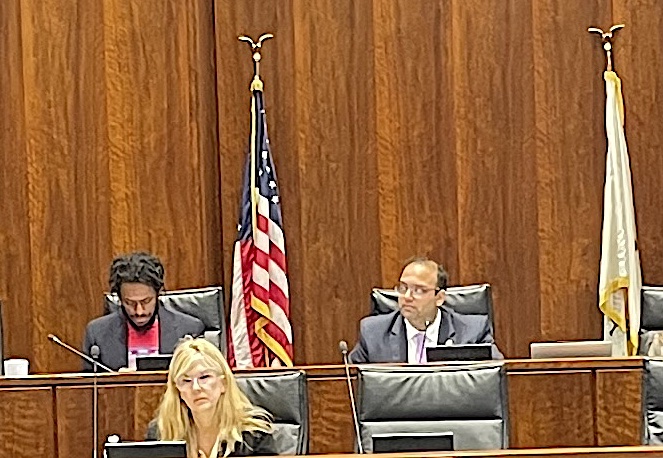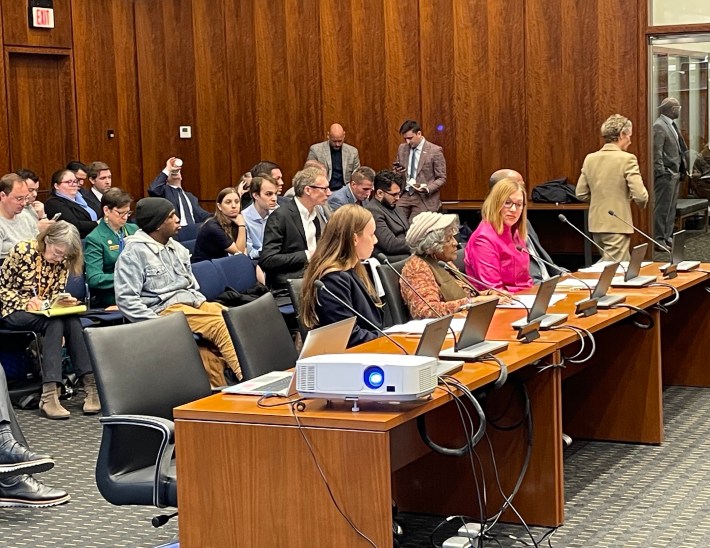
The Illinois State Senate's Transportation Committee met yesterday at the Bilandic Building, 160 N. LaSalle St. in the Loop, to discuss MMA. No, legislators did not get together to discuss mixed martial arts. Instead, they gathered to talk about the Metropolitan Mobility Authority proposal, which would consolidate the CTA, Metra, Pace, and the Regional Transportation Authority (which oversees the others) into a single agency.
During the past year, Senator Ram Villivalam (D-8th) and Representatives Eva-Dina Delgado (D-3rd) and Kam Buckner (D-26th) introduced a version of MMA in Springfield.
In advance of Tuesday's meeting, the Active Transportation Alliance urged members to fill out a witness slip (now expired) to support the latest MMA legislation, SB5. In a recent blog post by spokesperson Ted Villare, the advocacy group called the bill "a game-changing solution to our transit challenges... that would transform our transit system into one that is regionally focused and rider centered."
"This long-overdue move has garnered significant public support, with a statewide poll showing that voters favor the unification by a 2-1 margin," Villaire said. "The MMA comes with a companion appropriations bill that would allocate a minimum of $1.5 billion annually in additional operating funds for public transportation operations."

The additional funding would be key for avoiding the dreaded $770 million total regional transit fiscal cliff projected for 2026 as federal COVID-19 subsides run out, avoiding service cuts and paving the way for system upgrades.
Sen. Villivalam himself presided over yesterday's meeting to hear from those who supported the proposed bill, SB 5, and those who disapproved.

One of the people on the panel who voiced support for the MMA was Center for Neighborhood Technology Senior Director, Transportation and Policy Jackie Grimshaw, a veteran transit advocate (and this reporter's grandmother). She noted that transit can be a solution to multiple challenges like climate change and economic development, but in order for public transportation to be effective, "It has to work well, and people have to want to ride it."
"To deliver a seamless rider experience, we must stop thinking that our transit services are limited to city or suburban geographies," Ms. Grimshaw continued. "Riders transfer between services all the time. The way transit is covered should represent the integrated nature of riding transit in the Chicago region."
"For example, 40 percent of Pace riders transfer to CTA," she added. 70 percent of current transit rides delivered by Pace are in the city of Chicago. 30 percent of Metra stations are in the city of Chicago. 30 percent of suburban bus rides are provided by the CTA."
"We currently have three types of agencies that operate separately," Ms. Grimshaw noted. "They independently decide which capital projects to invest in, what the schedules for the trains and buses will be. They set their own fares. There is no form where the agencies proactively plan service together in an integrated fashion, and riders tell us that it shows."

Another panelist was Annie McGowan, Deputy Director of Research at the Civic Federation. She said that a thriving transit system is the backbone of Chicago's workforce and economy, but the current system is fragmented and does not operate efficiently. McGowan added that the state's current transit funding formula is outdated, and fails to account for changes in transit ridership. And she noted that the existing governance structure of 47 board total members for four agencies is excessive, and is not accountable or transparent.
"The funding crisis facing the RTA and the transit boards is not just a challenge, but an opportunity to reimagine the system that serves our city," McGowan argued. "Any funding discussion needs to be accompanied by the major reforms that will improve and integrate operations of this uber transit organization, ideally through consolidation of the transit boards into a unified system. We urge State lawmakers to take action to ensure Chicago's public transit system is not only sufficiently funded, but also streamlined to meet the needs of our future economy and workforce. It is critical to the competitiveness of the region."
But opponents the legislation also testified. One of them was Kane County Department of Transportation Deputy Director Tom Rickert. He said his county has been very active in improving mobility and enhancing transit hrough planning and programming various services. He maintained that, "In regards to SB 5, Kane County believes that consolidating all transit services under the MMA, with the simple majority [more than 50 percent vote by the authority's board members] for all action, is not necessary, and is potentially detrimental to Kane County's goal of improving transit for our residents," Rickert stated.
In a recent post about transit governance, Streetsblog contributor Richard Day argued that current Regional Transportation Authority board voting structure makes it difficult to take bold actions to improve the regional transit system. Any major changes require a vote of support by 12 members of the 16-member RTA board. "The RTA is [currently] hamstrung by a supermajority voting requirement that ensures either the City or suburban appointees can veto its decisions," he wrote.
"[The supermajority voting rule] also means the RTA can't hold the CTA, Metra, and Pace boards accountable for poor performance," Day said after Tuesday's meeting. "Any effort to cut or condition funding to the CTA can be blocked by city board members, and any effort to require better performance from Metra or Pace can be blocked by suburban board members." Read more about the issues with the current RTA board voting system in this Metropolitan Planning Council blog post.
"Kane County does believe strongly in transformational investment," Rickert concluded at yesterday's hearing. "Decisions need to include strong local representation. As such, the bill's recognition that the county's DOT is critical in improving transit should be included in any of the proposals that are being looked at."

Another person who spoke against the legislation was McHenry County’s Assistant Director of Transportation Scott Henning. He said his county believes transit reform has three bench principles. Those included the principal that increased State transit funding should be the highest priority of the legislation. Kane County would support new legislation to open the suburbs so that all sales tax-paying residents of the region would realize the benefits of our transit system. The third is that the best way to update the transit system is by strengthening the RTA: giving it more authority over fare policy, safety/security, capital planning, funding allocation, and regional service planning."
"We support aspects of this bill, such as the attention to agency executive performance and board member accountability," Henning concluded. "We also support the bill's focus on equitable transit-oriented development incentives and the recognition that roadway agencies such as the Illinois Tollway, IDOT, and county DOTs have pivotal roles to play to ensure transit operates efficiently. However, we continue to believe that consolidating all trains and services under the MMA is both unnecessary and potentially counterproductive to the goal of improving transit for our residents. By by requiring only a simple majority for all actions, MMA has the potential to be captured by interests that represent only one part of our region to the detriment of others."
The Senate Transportation Committee did not vote on Bill SB 5 during yesterday's meeting. Since this legislation involves funding, the vote will likely occur sometime in May.

Did you appreciate this post? Streetsblog Chicago is currently fundraising to help cover our 2025-26 budget. If you appreciate our reporting and advocacy on local sustainable transportation issues, please consider making a tax-deductible donation here. Thank you!





